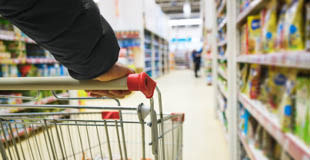Subsidiaries of Loblaw
- Atlantic Superstore
- Extra Foods
- Fortinos
- Loblaws
- Maxi
- No Frills
- Provigo
- Real Canadian Superstore
- Shoppers Drug Mart
- T&T Supermarket
- Valu-Mart
- Wholesale Club
Key Findings
- Loblaw Companies Limited (Loblaw) has a beyond restricted substance list (BRSL) of three chemicals that applies to packaging as well as products. Loblaw introduced a new corporate social responsibility (CSR) target to transition to phenol-free receipt paper across all divisions by year-end 2021.
- The company reported it completed the removal of triclosan and phthalates from household, beauty, and cosmetic products under its Life Brand and President’s Choice brand by the end of 2018 and more recently phased out bisphenol A (BPA) from infant formula pouches and tubs.
Recommendations for Loblaw
- Loblaw can make progress by developing a public written safer chemicals policy and establishing comprehensive BRSLs for food-contact materials and for household, beauty, and cosmetic products (going beyond the current BRSL).
- We urge the company to eliminate and safely replace any toxic indirect food additives that may be in food contact materials, with special attention to any bisphenols and per- and polyfluoroalkyl substances (PFAS) that may be in food packaging and other food contact materials as well as any phthalates that may be in food and food contact materials in its supply chain. The company should also eliminate and safely replace any PFAS, toxic flame retardants, and phthalates that may be in the products it sells. Loblaw should eliminate plastics of environmental health concern (PEHCs) from its product and packaging materials, and should take swift action to eliminate and safely replace key chemicals of concern from the beauty products of environmental justice concern that it sells.
- The company should become a signatory to the Chemical Footprint Project and pilot it with key private label suppliers. Loblaw should publicly disclose the alternatives used to replace CHCs or PEHCs after eliminating them.
Grade History
How does Loblaw compare to its competitors?
Analysis of Loblaw
Oversight: Established management responsibilities and incentives
Disclosure: Requires suppliers to report use of chemicals in products to retailer
Action: Reduced or eliminated chemicals of high concern (CHCs) or plastics of environmental health concern (PEHCs) within the last three years
Safer Alternatives: Evaluates safer alternatives, avoids regrettable substitutes
Transparency: Demonstrates a commitment to transparency and public disclosure
Third-party Standards: Promotes credible third-party standards for safer products
Extra Credit:
Joint Announcement: Public commitment demonstrated through joint announcement
Continuous Improvement: Shows continuous improvement by steadily expanding safer chemicals policy
Collaboration: Actively participates in collaborative process to promote safer chemicals
Impact Investment: Investing financial resources into independent research into safer alternatives and/or green chemistry solutions






